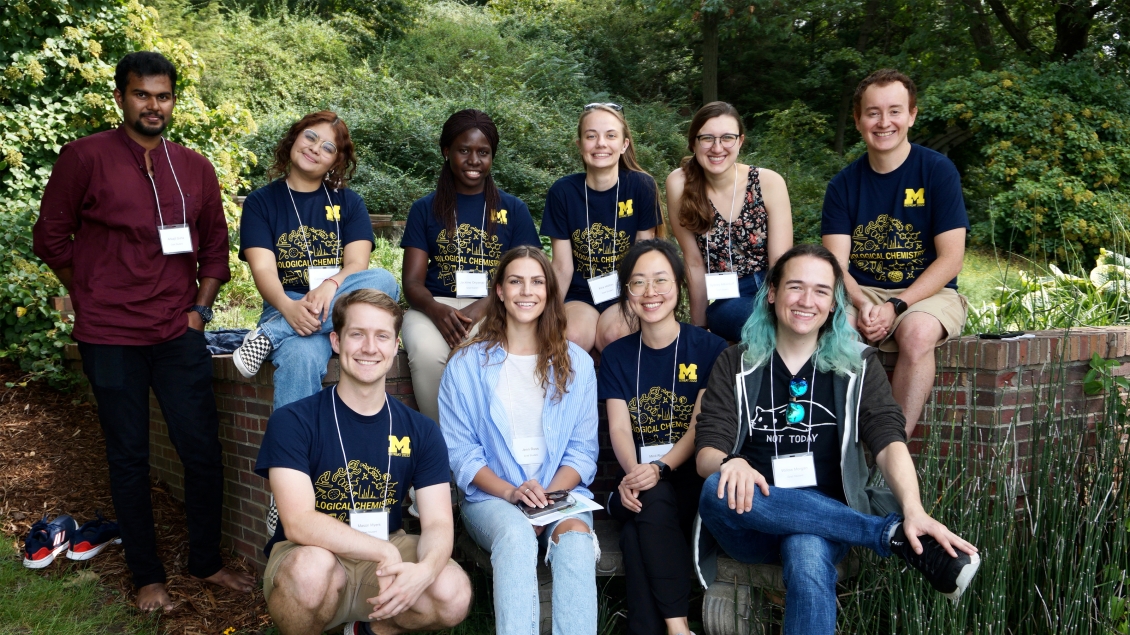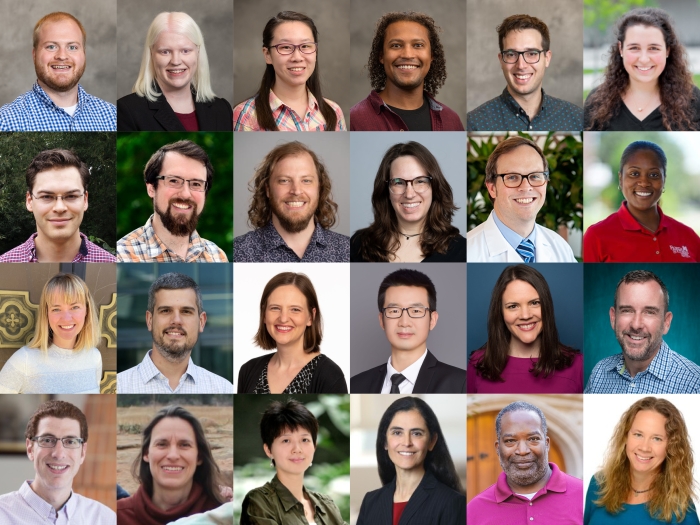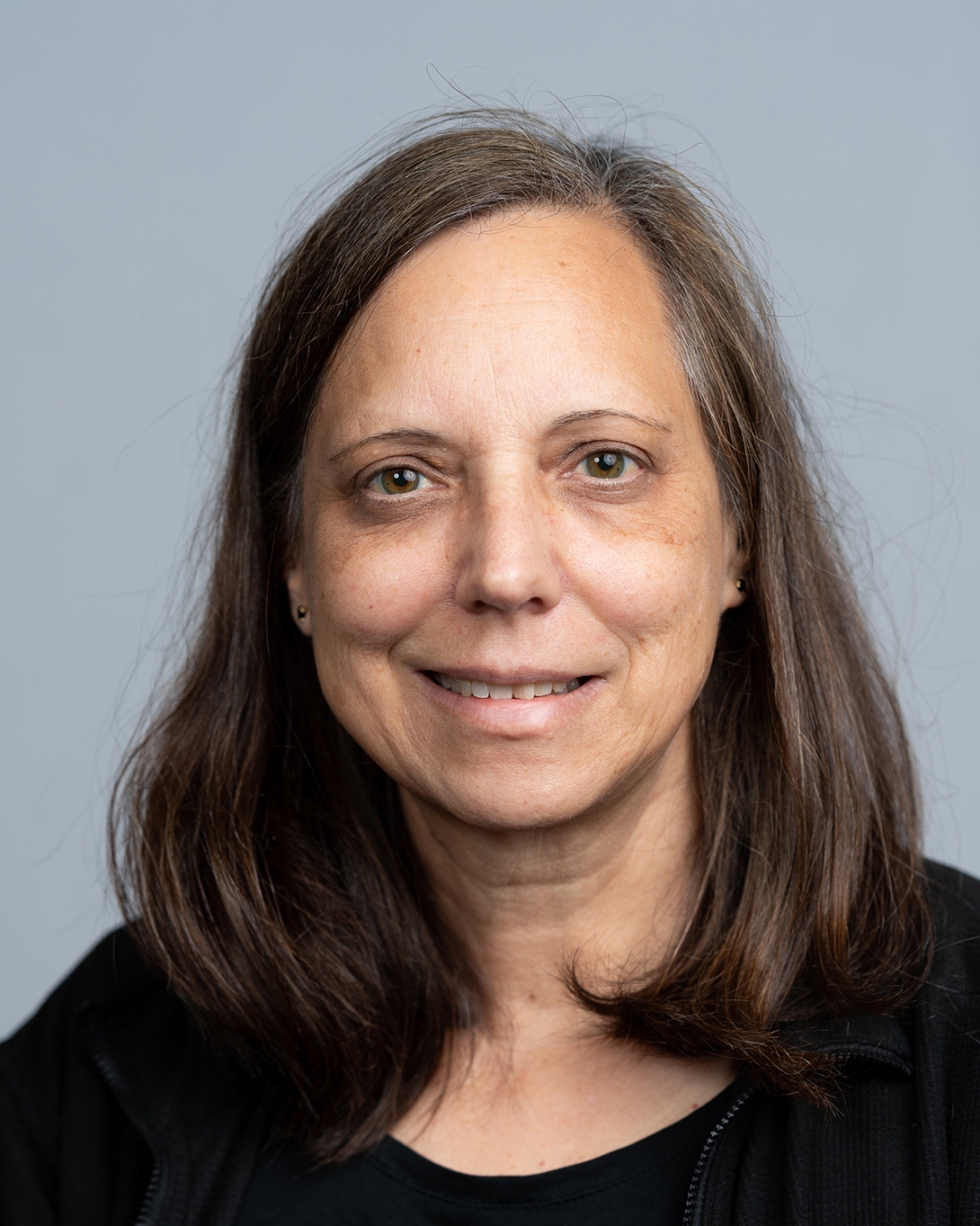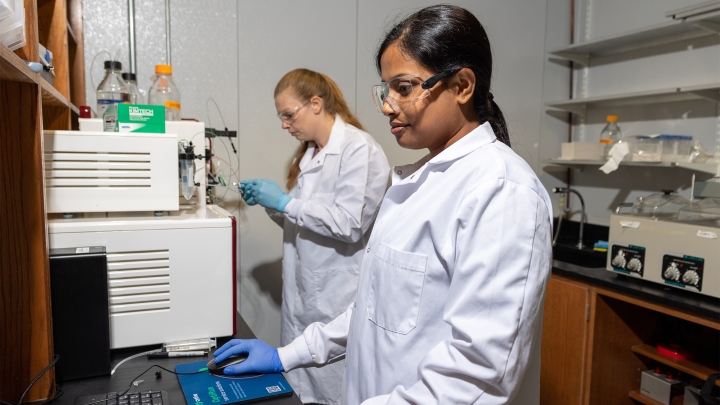
The PhD program in the U-M Medical School Department of Biological Chemistry provides a broad scientific training along with research specialization that together equip students for outstanding careers. Current areas of research include structural biology, protein biochemistry, enzyme reaction mechanisms, molecular genetics, signal transduction, neurobiology, and cell and developmental biology, along with cooperative research between laboratories or departments.
The common theme in our research is an interest in understanding biological phenomena at the molecular and mechanistic level. Our PhD graduates include two Nobel Prize winners and numerous others holding academic positions or responsible positions in research institutes or research-oriented companies.
Biological Chemistry applications are through the Program in Biomedical Sciences (PIBS), which offers students access to most of the bioscience PhD programs at the University of Michigan during their first year. Students need only apply to PIBS and designate Biological Chemistry as their PhD program of interest. This allows incoming students to either focus primarily on Biological Chemistry immediately upon entering graduate school, or to explore their research interests more broadly during their first year before committing to a specific PhD program.
A complete description of the PIBS gateway program and application process can be found at the PIBS site.
Graduate work in the Department of Biological Chemistry combines the rigor of advanced study with the flexibility for students to design their own optimal curriculum. Coursework consists of required and advanced electives in biochemistry, courses in critical analysis and scientific writing, graduate seminars, and elective courses for breadth. Graduate students present a research seminar to the department in their fourth year and informally present their research in poster sessions and at the annual retreat. Students are welcome and encouraged to actively engage in departmental service activities, including the Diversity, Equity, and Inclusion Committee, the Graduate Program Committee, and the PhD Student Recruitment Committee.
- BIOLCHEM 660 Molecules of Life: Protein, Structure, Function and Dynamics
- BIOLCHEM 711 Graduate Seminar
- BIOLCHEM 712 Biological Chemistry Seminar Series
- PHRMACOL 502 Introduction to Scientific Communication
- PIBS 503 Research Responsibility and Ethics
- PIBS 504 Rigor and Reproducibility
- Biological Chemistry Advanced Electives (two courses), including Eukaryotic Gene Transcription, Regulatory RNA and Control of Gene Expression, Enzyme Kinetics, Biochemistry of Membranes and Organelles, Protein Crystallography, and others
- Electives for breadth, including Introduction to Bioinformatics and Computational Biology, Cell Biology, Molecular Genetics, Techniques in Biophysical Chemistry, Cellular Biotechnology, and others
Department course descriptions and offerings can be found in the LSA Course Guide (search Credit Type: Graduate, and Subject: MED Biological Chemistry) and the LSA Graduate Course Catalog (search Department: MED Biological Chemistry).
At the end of their first year, students in Biological Chemistry write and orally defend an original research proposal. The written and oral components of the exam assess the student’s understanding of the required course content for the department and the student’s ability to reason analytically and to independently develop ideas and experimental approaches. Through this mechanism, students gain valuable experience in the preparation of a competitive research proposal and in the development of independence in scientific reasoning.
Incoming PIBS PhD students become familiar with graduate research opportunities by engaging in research rotations during both Fall and Winter terms. They may also inquire about their eligibility for a full-time summer research rotation. Students select a mentor and PhD program after completing the PIBS year.
To join the Biological Chemistry PhD program, students choose a mentor who is a faculty member or affiliate faculty member in Biological Chemistry. Full-time laboratory research begins by the summer following the PIBS year. A student's mentor provides guidance in selecting a dissertation research topic, in selecting a dissertation committee, and in other aspects of the student's graduate career and professional development. In addition, the graduate program director and graduate program advisors provide mentorship during the graduate school experience.
PhD students in Biological Chemistry gain valuable teaching experience by serving as teaching assistants for one semester. Students interested in developing teaching skills can also participate in workshops offered by the U-M Center for Research on Learning and Teaching (CRLT), such as “Preparing Future Faculty” and teaching certificate programs.
Our student handbook is an in-depth guide detailing the PhD program academic requirements, departmental events, graduate student commitments and more.
Our PhD students range from recent arrivals who are in the process of choosing their research mentors to advanced students who are completing their doctoral dissertations.
- Annual Department Research Retreat - The student-organized Biological Chemistry research retreat, typically held at the beginning of the fall semester at the Kellogg Biological Station on Gull Lake in Western Michigan, provides students, postdoctoral fellows, research staff, and faculty an opportunity to present and discuss research in a relaxed and informal setting. All first year PIBS and MSTP students are invited to attend.
- Department Seminar Program - Biological Chemistry sponsors a weekly seminar program that attracts speakers of international reputation. Students can participate in the selection, invitation, and hosting of speakers for this seminar series.
- Student Research Seminars - Students in the department meet for lunch, conversation, and an informal research talk. This gathering provides an opportunity for students to keep in touch with their colleagues and to share scientific expertise and advice.
- Happy Hours - Students and other members of the department are regularly invited to gather at local establishments in Ann Arbor to enjoy conversation and appetizers.
By contributing their time, energy, and unique perspectives, our students provide valuable service to fellow students, the department, and the university community.
- Sydney Alibeckoff
- Carmen Castillo
- Alexi Chabez
- Vishakha Choudhary
- Giselle Flores
- Stephen Gonzalez
- Arkajit Guha
- Andres Herrera Tequia
- Kira Holton
- Kailyn Jessel
- Chase Lindeboom
- Claudia Mak
- Alex Missman
- Basila Moochickal Assainar
- Mason Myers
- Yulduz Rakibova
- Michael Rankin
- Minli Ruan
- Renke Tan
- Zoe Yeoh
- Natalia Harris
- Andres Herrera Tequia
- Cara Loomis (Main Campus)
- Minli Ruan (Chemistry)
- Sydney Alibeckoff (MSRB III)
- Alexi Chabez
- Sharon Garrott
- Kira Holton
- Basila Moochickal Assainar
- Rosa Romero
- Minli Ruan
- Anibal Tornes Blanco
- Natalia Ubilla
DEI Committee Mission Statement
Our purpose is to foster a collaborative community that affirms our experiences.
Our mission is to provide consultation on initiatives important to inclusion efforts, promoting cultural sensitivity and integrating values of DEI into the Department.
We seek to:
- Evaluate the departmental climate to identify and address existing issues
- Create supportive spaces for engaging in uncomfortable conversations
- Foster diverse interests and career goals of all trainees, faculty, and staff
- Catalyze sense of belonging through social celebrations of our diverse community
- Provide resources and organize pilot programs that accomplish these objectives
We do this because:
- Individuals experience unique challenges navigating higher education
- We want to ensure retention of members of our community at every level
- Collaboration across different backgrounds produces innovations in fundamental medical research and fundamental change in society
We invite anyone in the Biological Chemistry community to communicate with us relevant to our mission: to discuss, suggest, and participate with us.
- Arkajit Guha
- Claudia Mak
- Giselle Flores
- Andres Herrera Tequia
- Mason Myers
- Rosa Romero
- Minli Ruan
- Zoe Yeoh
Biological Chemistry students successfully compete for positions on NIH training grants and for numerous departmental, institutional, regional, and national awards.
Examples of honors received by our PhD students:
- Department Awards
- U-M Medical School Awards: Graduate Student Awards for Excellence
- U-M Rackham Graduate School Awards: Barbour Scholarships, Rackham Predoctoral Fellowships, Distinguished Dissertation Awards
- National awards: the Harold M. Weintraub Graduate Student Award, the P.E.O. Scholar Award, predoctoral fellowships from the American Heart Association, the Ford Foundation, the National Science Foundation, and the National Institutes of Health
Students in the PhD program in Biological Chemistry typically receive their degree within 5 to 6 years (the average is less than 6 years, which is also the average for PhD programs in biological sciences at the University). Many of our graduates have gone on to hold major academic, government, and industrial research positions. Additionally, some of our students have pursued careers in scientific public policy, public health, patent law, and clinical or scientific editing. Two graduates of the department, Stanley Cohen, who discovered epidermal growth factor, and Marshall Nirenberg, who cracked the genetic code, were Nobel Prize laureates.

Our graduates stay connected to each other and to the department through friendships and scientific collaborations, a sense of shared community and history, and a common passion for discovery at the frontiers of biological chemistry.



Our interdisciplinary research into the molecular mechanisms of life offers a wide variety of investigative opportunities to students and fellows.

We find a new reason to love Ann Arbor nearly every day — year-round outdoor activities, cultural experiences, a growing food scene, and a welcoming, family-friendly atmosphere are just a few that come to mind. Explore all that Ann Arbor and our surrounding communities have to offer.